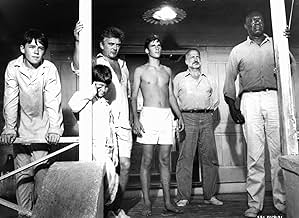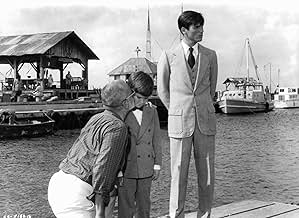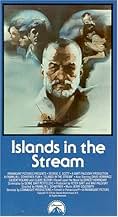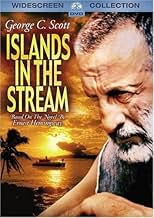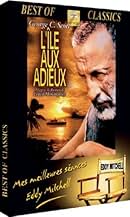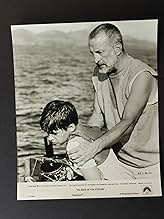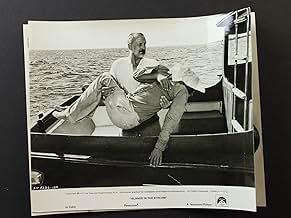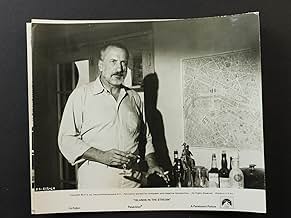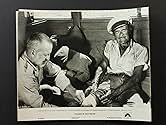AVALIAÇÃO DA IMDb
6,5/10
1,7 mil
SUA AVALIAÇÃO
Adicionar um enredo no seu idiomaAn isolated sculptor is visited by his three sons just before the start of WWII.An isolated sculptor is visited by his three sons just before the start of WWII.An isolated sculptor is visited by his three sons just before the start of WWII.
- Direção
- Roteiristas
- Artistas
- Indicado a 1 Oscar
- 4 indicações no total
- Direção
- Roteiristas
- Elenco e equipe completos
- Produção, bilheteria e muito mais no IMDbPro
Avaliações em destaque
This film had been slated by some English critics I later discovered - one describing it as "awful". I hadn't read about it beforehand and was pleasantly surprised - no violence, explosions, sex! A soft, gentle film with romantic and family angst heavily emphasised. George C Scott was excellent in the 'Hemingway' role and had splendid support from the rest of the cast, especially Claire Bloom and Julius Harris (I except David Hemmings from this who came close to spoiling it with hamming it up; very annoying). The ending didn't do the rest of it justice, I felt; a little too much sugar! Well photographed and a good score too. A good film for a wet afternoon.
With Islands In The Stream, George C. Scott took his place as an existential Hemingway hero along side such Hollywood luminaries as Gary Cooper, Humphrey Bogart, Gregory Peck, Spencer Tracy, Tyrone Power and Rock Hudson. With that beard he grew for the film he even looks the part of Hemingway.
In this partially autobiographical novel it's first set in the Bahamas where Scott, a painter has gone to get away from the rest of the world. He fishes, he consorts with loose women, and when he's got time and a need for cash, he paints and sells the product to keep going. It sounds like an ideal existence.
Unfortunately World War II intervenes and his three sons by different women all visit him. The oldest, Hart Bochner, has made his mind up to enlist in the Royal Air Force. The two youngest go back to Europe.
One of Scott's good friend is charter boat captain Gilbert Roland who has a side living smuggling refugees, mostly Jews, from Europe to any place in the western hemisphere he can drop them off. A lot times that's Cuba, but the Cuban government is taking a dim view of his activities.
Scott also has as two good friends, native Bahamian Julius Harris, and David Hemmings a young man with a drinking problem. Hemmings's character is ripped off from Hemingway's previous story, To Have and Have Not although Walter Brennan was a good deal older. He even used the same name.
Claire Bloom is also around as the first wife who visits after their son leaves for service. Scott still loves her in his own way, but she's well aware of his fidelity problem. To remind them both is working girl Susan Tyrell.
Ernest Hemingway wrote the story in the early Fifties and discarded it and his widow published it in the early seventies. Probably Papa Hemingway didn't think all that much of it. It certainly doesn't rate with some of his better known work. But second rate Hemingway is better than first rate from most writers.
The cast all give uniformly good performances and the cinematography is just great. Reason enough to see it.
In this partially autobiographical novel it's first set in the Bahamas where Scott, a painter has gone to get away from the rest of the world. He fishes, he consorts with loose women, and when he's got time and a need for cash, he paints and sells the product to keep going. It sounds like an ideal existence.
Unfortunately World War II intervenes and his three sons by different women all visit him. The oldest, Hart Bochner, has made his mind up to enlist in the Royal Air Force. The two youngest go back to Europe.
One of Scott's good friend is charter boat captain Gilbert Roland who has a side living smuggling refugees, mostly Jews, from Europe to any place in the western hemisphere he can drop them off. A lot times that's Cuba, but the Cuban government is taking a dim view of his activities.
Scott also has as two good friends, native Bahamian Julius Harris, and David Hemmings a young man with a drinking problem. Hemmings's character is ripped off from Hemingway's previous story, To Have and Have Not although Walter Brennan was a good deal older. He even used the same name.
Claire Bloom is also around as the first wife who visits after their son leaves for service. Scott still loves her in his own way, but she's well aware of his fidelity problem. To remind them both is working girl Susan Tyrell.
Ernest Hemingway wrote the story in the early Fifties and discarded it and his widow published it in the early seventies. Probably Papa Hemingway didn't think all that much of it. It certainly doesn't rate with some of his better known work. But second rate Hemingway is better than first rate from most writers.
The cast all give uniformly good performances and the cinematography is just great. Reason enough to see it.
I found this film in the bargain DVD bin, so I went ahead and got it. The movie moves slow, but in a peaceful way, capturing the charm of real-life in the Caribbean. It's mostly an atmosphere-movie -- the charm of the movie is not so much in it's plot (Hemingway writes much better than his movies translate) but in the feel of the characters, and the beauty of its locale.
Set in the 1940's, it barely touches on WWII, and when it does, it seems to do so 'down a long hallway, darkly' -- that is to say, it feels distant.
George C Scott does a pretty darned good job with the lead character. Great actors never fail to elevate a movie. There's another fine performance put in by David Hemmings (Who I'd never seen before, and I learn from the IMDb database died in 2003) as the 'rummy' named Eddy.
The musical score is weird -- it really seems to stay with you after the movie is done. The previous commenter is correct -- the movie has a dreamy feel to it. There's very little by way of violence (at least by today's standards). What little there is, at the end, is accompanied by garishly bright and unrealistic blood.
Nonetheless, check this film out. It's truly an interesting and fun film.
Set in the 1940's, it barely touches on WWII, and when it does, it seems to do so 'down a long hallway, darkly' -- that is to say, it feels distant.
George C Scott does a pretty darned good job with the lead character. Great actors never fail to elevate a movie. There's another fine performance put in by David Hemmings (Who I'd never seen before, and I learn from the IMDb database died in 2003) as the 'rummy' named Eddy.
The musical score is weird -- it really seems to stay with you after the movie is done. The previous commenter is correct -- the movie has a dreamy feel to it. There's very little by way of violence (at least by today's standards). What little there is, at the end, is accompanied by garishly bright and unrealistic blood.
Nonetheless, check this film out. It's truly an interesting and fun film.
From the opening score and scenes of the water, I was drawn to watch this movie. It was filmed somewhere in the Caribbean and the location was breathtaking. George C. Scott was perfect in the role of Tom Hudson, an Ernest Hemingway-ish character who was a complicated, lonely artist and expatriate who sculpted, drank, and fished his life away. It wasn't until the tragic end that he came to know what he'd been missing.
The music score was haunting and beautiful. I was so impressed with it that I ordered the soundrack.
The music score was haunting and beautiful. I was so impressed with it that I ordered the soundrack.
This adaptation of a series of Hemingway stories never fails to be engaging. George C. Scott stars as a sculptor, Thomas Hudson, who lives in a Bahamian island paradise in 1940. The world is on the cusp of WWII, but people like Thomas aren't likely to be deeply affected by it, apart from the Jewish refugees that sometimes turn up on their island. That summer, Thomas is visited by his three sons - Tom (Hart Bochner), Andy (Brad Savage), and Davy (Michael-James Wixted) - whom he's sired with two different wives.
The script, by Denne Bart Petitclerc, follows a three-act structure, as it portrays Thomas' relationship with "The Boys", is visited by Toms' mother (Claire Boom) during "The Woman", and they reminisce about their past, and finally, shows what happens as Thomas and his friends Joseph (Julius Harris) and Eddy (David Hemmings) undertake "The Journey", wherein they act upon a chance to do some good.
Reuniting Scott with his "Patton" director, Franklin J. Schaffner, "Islands in the Stream" is a deliberately paced drama with a pleasant feel to it during its first two thirds, and an almost dream-like quality. Certainly it's very easy on the eyes, with its gorgeous photography of these exotic locations. It's also accompanied by a wonderful Jerry Goldsmith soundtrack. While some viewers might feel that the film goes downhill in its final third, this viewer never lost interest (although, admittedly, "Islands in the Stream" is never better than when it's a story of a father and his sons).
Scott gives one of his most engaging performances of all time, with similarly laudable work by such performers as Harris ("Live and Let Die"), Hemmings ("Deep Red"), Bloom ("The Haunting"), Gilbert Roland ("The Bad and the Beautiful"), Susan Tyrrell ("Forbidden Zone"), and Richard Evans ("Dirty Little Billy"). Bochner (in his feature debut), Savage, and Wixted are very appealing as the sons.
Overall, this is definitely worth a look: a nicely nuanced look at an interesting man - maybe not a truly great man - but who has certainly earned the admiration of his friends and offspring.
Seven out of 10.
The script, by Denne Bart Petitclerc, follows a three-act structure, as it portrays Thomas' relationship with "The Boys", is visited by Toms' mother (Claire Boom) during "The Woman", and they reminisce about their past, and finally, shows what happens as Thomas and his friends Joseph (Julius Harris) and Eddy (David Hemmings) undertake "The Journey", wherein they act upon a chance to do some good.
Reuniting Scott with his "Patton" director, Franklin J. Schaffner, "Islands in the Stream" is a deliberately paced drama with a pleasant feel to it during its first two thirds, and an almost dream-like quality. Certainly it's very easy on the eyes, with its gorgeous photography of these exotic locations. It's also accompanied by a wonderful Jerry Goldsmith soundtrack. While some viewers might feel that the film goes downhill in its final third, this viewer never lost interest (although, admittedly, "Islands in the Stream" is never better than when it's a story of a father and his sons).
Scott gives one of his most engaging performances of all time, with similarly laudable work by such performers as Harris ("Live and Let Die"), Hemmings ("Deep Red"), Bloom ("The Haunting"), Gilbert Roland ("The Bad and the Beautiful"), Susan Tyrrell ("Forbidden Zone"), and Richard Evans ("Dirty Little Billy"). Bochner (in his feature debut), Savage, and Wixted are very appealing as the sons.
Overall, this is definitely worth a look: a nicely nuanced look at an interesting man - maybe not a truly great man - but who has certainly earned the admiration of his friends and offspring.
Seven out of 10.
Você sabia?
- CuriosidadesJerry Goldsmith often said this was his favorite score he composed.
- Erros de gravaçãoWhen the boat is slowly cruising up the river in Cuba looking for refugees, a crew member's hand can be seen moving tree branches away from the camera.
- Citações
Thomas Hudson: I know now there's no "one thing" that is true. It is all true.
- ConexõesFeatured in Survival Scars: Franklin J. Schaffner as Auteur (2023)
Principais escolhas
Faça login para avaliar e ver a lista de recomendações personalizadas
- How long is Islands in the Stream?Fornecido pela Alexa
Detalhes
- Data de lançamento
- País de origem
- Idiomas
- Também conhecido como
- Islands in the Stream
- Locações de filme
- Kaua'i, Havaí, EUA(Home)
- Empresas de produção
- Consulte mais créditos da empresa na IMDbPro
Bilheteria
- Faturamento bruto nos EUA e Canadá
- US$ 5.596.173
- Faturamento bruto mundial
- US$ 5.596.173
Contribua para esta página
Sugerir uma alteração ou adicionar conteúdo ausente


